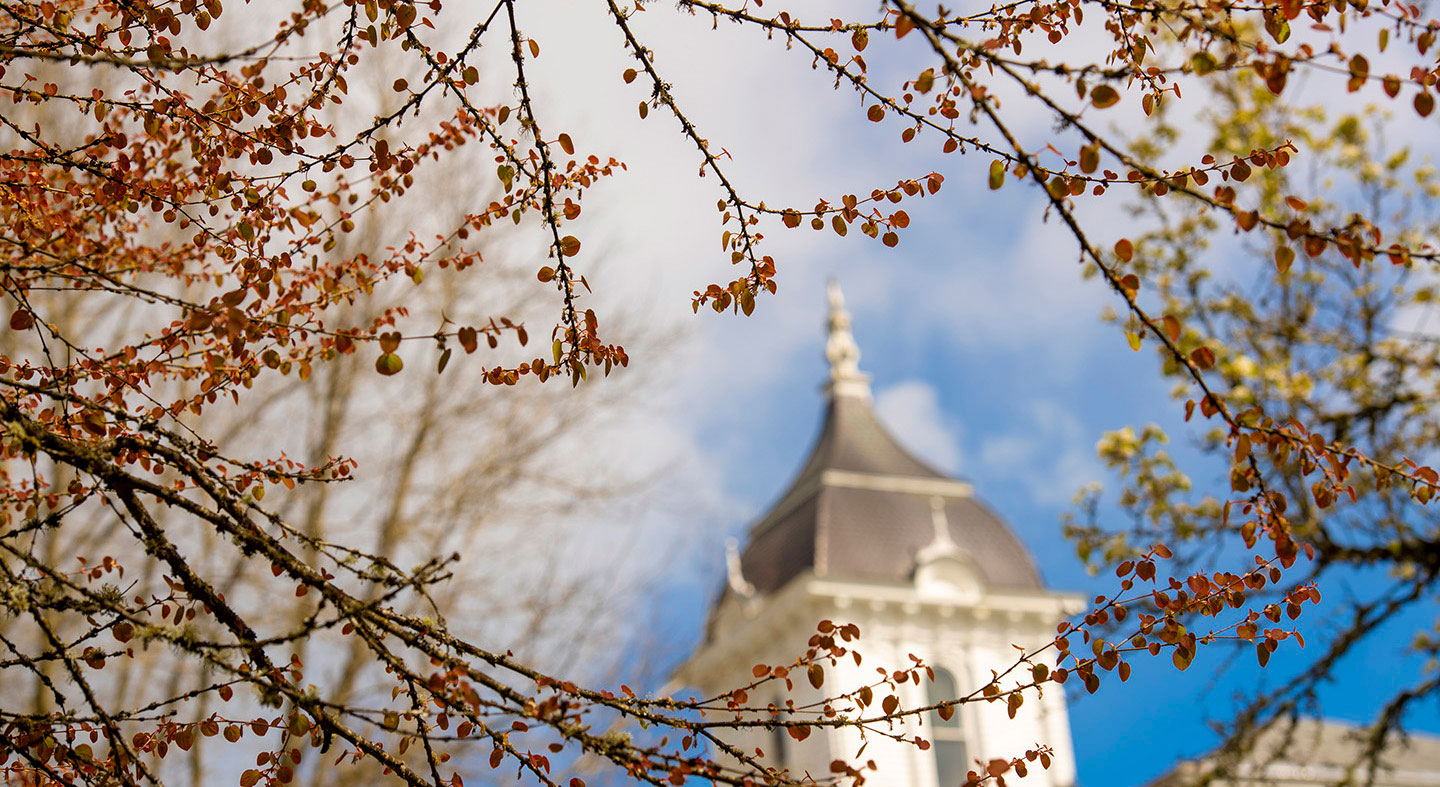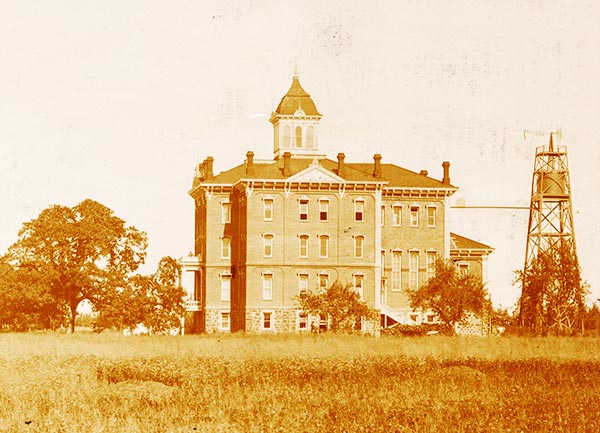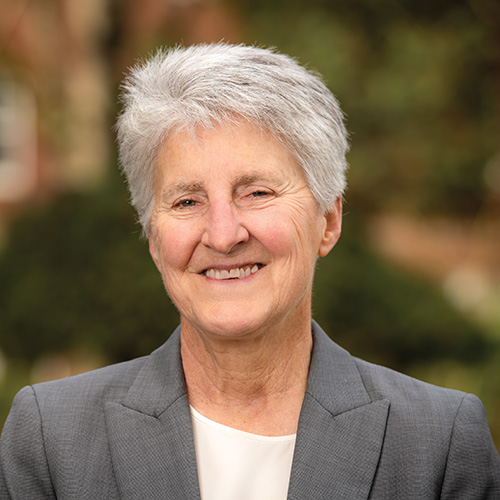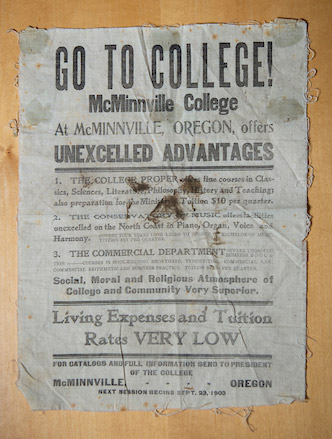
Linfield's History
The early years
 Linfield University is one of the oldest institutions of higher learning on the West Coast. It traces its origins to a Baptist-led school established in 1849 in Oregon City. It eventually relocated and was chartered by the Oregon Territorial Legislature in 1858 as the Baptist College at McMinnville. Later, the name was shortened to McMinnville College. Through the early years, the college also served as McMinnville’s secondary school and didn’t award its first baccalaureate degree until 1884.
Linfield University is one of the oldest institutions of higher learning on the West Coast. It traces its origins to a Baptist-led school established in 1849 in Oregon City. It eventually relocated and was chartered by the Oregon Territorial Legislature in 1858 as the Baptist College at McMinnville. Later, the name was shortened to McMinnville College. Through the early years, the college also served as McMinnville’s secondary school and didn’t award its first baccalaureate degree until 1884.
In 1922, Frances Ross Linfield donated significant real estate holdings to the school. This transformational gift secured the financial future of the institution. In honor of the gift, trustees at her request renamed the school in honor of her late husband, Rev. George Fisher Linfield.
The 1970s were a time of academic growth at Linfield. Graduate degrees were added, which were awarded through the 1990s. What is now known as the Online and Continuing Education (OCE) program began as a distance-learning opportunity for working adults in 1975. OCE moved to offering online degrees, certificates and endorsements in the 1990s. In addition, Linfield’s commitment to international experiences began in 1976 with a student exchange program in Japan. Today, international experiences are a key part of the Linfield experience with January Term, semester and full-year programs in multiple countries.
Expanding to Portland
 Linfield established its Portland campus in 1982, when the college entered into an affiliation with Good Samaritan Hospital and began offering a Bachelor of Science in Nursing in the Linfield-Good Samaritan School of Nursing. The Good Samaritan nursing program traces its roots to 1890 and founder Emily Loveridge. With this heritage, Linfield’s program is the oldest continuously operated nursing school in the Pacific Northwest.
Linfield established its Portland campus in 1982, when the college entered into an affiliation with Good Samaritan Hospital and began offering a Bachelor of Science in Nursing in the Linfield-Good Samaritan School of Nursing. The Good Samaritan nursing program traces its roots to 1890 and founder Emily Loveridge. With this heritage, Linfield’s program is the oldest continuously operated nursing school in the Pacific Northwest.
Recent history
In the late 1990s, the institution acquired the former Hewlett-Packard property adjacent to the McMinnville campus, which more than doubled the size of the campus and opened new opportunities for the school.
With its McMinnville campus in the heart of wine country, Linfield has a strong partnership with the wine industry. The Oregon Wine History Archive was founded at Linfield in 2011 and the Center for Wine Education opened in 2018. The Center for Wine Education also features multiple undergraduate, graduate and certificate programs.
Linfield today
Linfield College transformed into Linfield University in July 2020. With this transition, a College of Arts and Sciences and a School of Business were added and a 20-acre campus was acquired in Portland to house the School of Nursing. Graduate degrees returned, offering new programs catering to both industry and student interest. Altogether, the shifts were designed to help the university expand strategically and serve the needs of rapidly changing student demographics.
Another shift happened in February 2023 with the opening of the Linfield University Science Complex, featuring the W.M. Keck Science Center as well as significant renovations to Graf and Murdock halls. The 84,400-square-foot science complex features teaching labs, areas for research and spaces dedicated to wine studies. With a 232% increase in research space, the complex is built to provide state-of-the-art learning and collaborative research for generations to come.
Commitment to community and inclusion
While Linfield values its roots and honors its longstanding history, the university no longer has an affiliation with American Baptist Churches U.S.A., and there are no religious or doctrinal requirements for students or employees. Linfield is an inclusive and welcoming academic community that values diversity in background, belief and perspective.
As a comprehensive private university, Linfield integrates education in the liberal arts and sciences and in selected professional disciplines. The uncommon experiences that make up a Linfield education — the unique learning opportunities, understanding of new cultures and perspectives and exploration of passions — continue to be central to the overall experience.
With a relentless focus on student success, Linfield remains as committed as it has ever been to a mission of connecting learning, life and community.
This is just the beginning
More exciting changes lie ahead
Dr. Mark Blegen named 21st president of Linfield University

Dr. Mark Blegen named 21st president of Linfield University
The Linfield University Board of Trustees announces that Dr. Mark Blegen will become the institution’s next president on July 1, 2025.
Linfield begins search for the next president

Linfield begins search for the next president
Miles Davis announces his departure, Becky Johnson is named interim president and plans are set to search for a new president.
Visit the digital archive

Visit the digital archive
Learn more about Linfield's history by visiting the library's digital archive.
Linfield University
Land Acknowledgment
At Linfield, we recognize that the land that our physical campuses are located on were the traditional territories of the “Yam Hill” band of the Kalapuya people in McMinnville and the Chinookan peoples known as the Clackamas and Cascade Tribes in Portland. In January 1855, the people of these tribes were forcibly removed from the land after the signing of the Willamette Valley Treaty. They are now among 30 tribes and bands that make up the Confederated Tribes of Grand Ronde.
